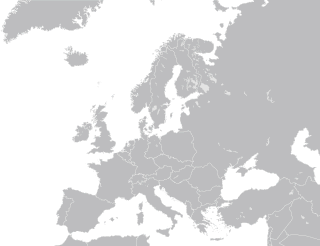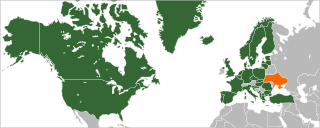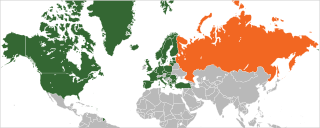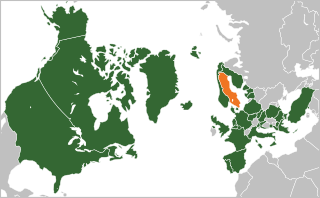| |||||
| Decades: | |||||
|---|---|---|---|---|---|
| See also: | |||||
The following lists events that happened during 2014 in Finland.
| |||||
| Decades: | |||||
|---|---|---|---|---|---|
| See also: | |||||
The following lists events that happened during 2014 in Finland.

The foreign relations of Finland are the responsibility of the president of Finland, who leads foreign policy in cooperation with the government. Implicitly the government is responsible for internal policy and decision making in the European Union. Within the government, preparative discussions are conducted in the government committee of foreign and security policy, which includes the Prime Minister and at least the Minister of Foreign Affairs and the Minister of Defence, and at most four other ministers as necessary. The committee meets with the President as necessary. Laws concerning foreign relations are discussed in the parliamentary committee of foreign relations. The Ministry of Foreign Affairs implements the foreign policy.

The North Atlantic Treaty Organization, also called the North Atlantic Alliance, is an intergovernmental military alliance of 32 member states—30 European and 2 North American. Established in the aftermath of World War II, the organization implements the North Atlantic Treaty, signed in Washington, D.C., on 4 April 1949. NATO is a collective security system: its independent member states agree to defend each other against attacks by third parties. During the Cold War, NATO operated as a check on the threat posed by the Soviet Union. The alliance remained in place after the dissolution of the Soviet Union and the Warsaw Pact, and has been involved in military operations in the Balkans, the Middle East, South Asia, and Africa. The organization's motto is animus in consulendo liber. The organization's strategic concepts include deterrence.

Jens Stoltenberg is a Norwegian politician who served as the 13th secretary general of NATO from 2014 to 2024. A member of the Norwegian Labour Party, he was previously the 34th prime minister of Norway from 2000 to 2001 and again from 2005 until 2013.

The International Security Assistance Force (ISAF) was a multinational military mission in Afghanistan from 2001 to 2014. It was established by United Nations Security Council Resolution 1386 according to the Bonn Agreement, which outlined the establishment of a permanent Afghan government following the U.S. invasion in October 2001. ISAF's primary goal was to train the Afghan National Security Forces (ANSF) and assist Afghanistan in rebuilding key government institutions; it gradually took part in the broader war in Afghanistan against the Taliban insurgency.
The National Coalition Party is a liberal-conservative political party in Finland. It is currently the largest and the governing political party of Finland.

Sauli Väinämö Niinistö is a Finnish politician who served as the 12th president of Finland from 2012 to 2024.
Same-sex marriage has been legal in Finland since 1 March 2017. A bill for the legalisation of same-sex marriages was approved by the Finnish Parliament in a vote of 101–90 on 12 December 2014, and signed into law by President Sauli Niinistö on 20 February 2015. Further legislation to harmonise other laws with the legalisation of same-sex marriage was passed in 2016. The law took effect on 1 March 2017. Polling suggests that a majority of Finns support the legal recognition of same-sex marriage. Finland was the last Nordic sovereign state, the twelfth country in Europe and the twentieth in the world to allow same-sex couples to marry nationwide.

Cai-Göran Alexander Stubb is a Finnish politician serving as the 13th president of Finland, in office since 1 March 2024, having won the 2024 presidential election. He previously served as prime minister of Finland from 2014 to 2015.

Sir Robert Ben Lobban Wallace is a British politician and former British Army Officer who served as Secretary of State for Defence from 2019 to 2023. A member of the Conservative Party, he was the Member of Parliament (MP) for Wyre and Preston North, formerly Lancaster and Wyre, from 2005 to 2024.

Russia–European Union relations are the international relations between the European Union (EU) and Russia. Russia borders five EU member states: Estonia, Finland, Latvia, Lithuania and Poland; the Russian exclave of Kaliningrad is surrounded by EU members. Until the radical breakdown of relations following the 2022 Russian invasion of Ukraine, the EU was Russia's largest trading partner and Russia had a significant role in the European energy sector. Due to the invasion, relations became very tense after the European Union imposed sanctions against Russia. Russia placed all member states of the European Union on a list of "unfriendly countries", along with NATO members, Switzerland, Ukraine, and several Asia-Pacific countries.

The United States and Russia maintain one of the most important, critical, and strategic foreign relations in the world. Both nations have shared interests in nuclear safety and security, nonproliferation, counterterrorism, and space exploration.

Pekka Olavi Haavisto is a Finnish politician of the Green League who served as the Minister for Foreign Affairs from 2019 to 2023.

NATO is a military alliance of thirty-two European and North American countries that constitutes a system of collective defense. The process of joining the alliance is governed by Article 10 of the North Atlantic Treaty, which allows for the invitation of "other European States" only and by subsequent agreements. Countries wishing to join must meet certain requirements and complete a multi-step process involving political dialogue and military integration. The accession process is overseen by the North Atlantic Council, NATO's governing body. NATO was formed in 1949 with twelve founding members and has added new members ten times. The first additions were Greece and Turkey in 1952. In May 1955, West Germany joined NATO, which was one of the conditions agreed to as part of the end of the country's occupation by France, the United Kingdom, and the United States, prompting the Soviet Union to form its own collective security alliance later that month. Following the end of the Franco regime, newly democratic Spain chose to join NATO in 1982.

Relations between Ukraine and the North Atlantic Treaty Organization (NATO) started in 1991 following Ukraine's independence after the dissolution of the Soviet Union. Ukraine-NATO ties gradually strengthened during the 1990s and 2000s, and Ukraine aimed to eventually join the alliance. Although co-operating with NATO, Ukraine remained a neutral country. After it was attacked by Russia in 2014, Ukraine has increasingly sought NATO membership.

Relations between the NATO military alliance and the Russian Federation were established in 1991 within the framework of the North Atlantic Cooperation Council. In 1994, Russia joined the Partnership for Peace program, and on 27 May 1997, the NATO–Russia Founding Act (NRFA) was signed at the 1997 Paris NATO Summit in France, enabling the creation of the NATO–Russia Permanent Joint Council (NRPJC). Through the early part of 2010s NATO and Russia signed several additional agreements on cooperation. The NRPJC was replaced in 2002 by the NATO-Russia Council (NRC), which was established in an effort to partner on security issues and joint projects together.

The Russo-Ukrainian War began in February 2014. Following Ukraine's Revolution of Dignity, Russia occupied and annexed Crimea from Ukraine and supported pro-Russian separatists fighting the Ukrainian military in the Donbas War. These first eight years of conflict also included naval incidents and cyberwarfare. In February 2022, Russia launched a full-scale invasion of Ukraine and began occupying more of the country, starting the biggest conflict in Europe since World War II. The war has resulted in a refugee crisis and tens of thousands of deaths.

Finland has been a member of the North Atlantic Treaty Organization (NATO) since 4 April 2023.
Events in the year 2022 in Sweden.

Sweden has been a member of the North Atlantic Treaty Organization (NATO) since 7 March 2024.

Turkey has been a member of NATO since 1952, has its second largest army and is the host of the Allied Land Command headquarters. The Incirlik and Konya Airbases have both been involved in several NATO military operations since their establishment. The current ambassador to NATO is Zeki Levent Gümrükçü.